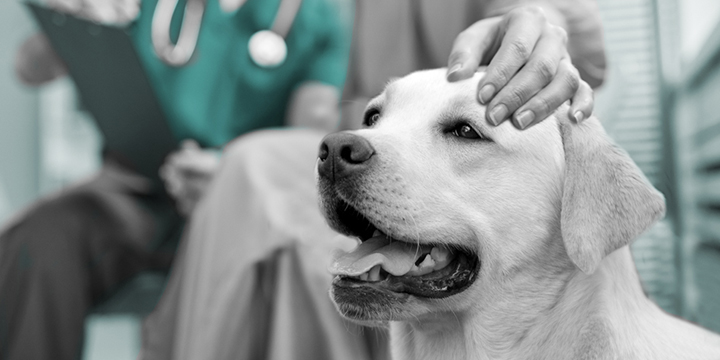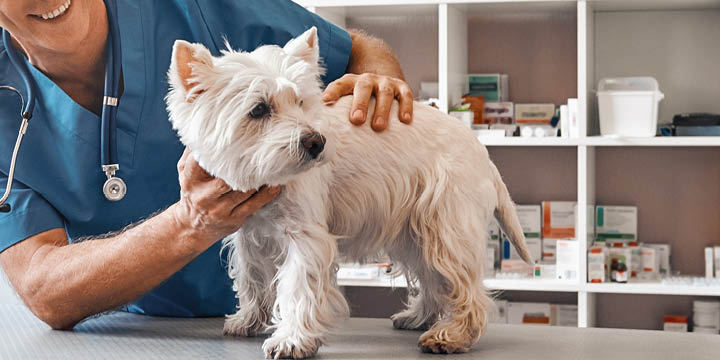Parvovirus (Parvo)
What is it?
This extremely contagious disease is caused by a virus that attacks the lining of the small intestine and bone marrow. In some very young puppies, it may attack the heart muscles. Parvovirus affects dogs who are unvaccinated or who haven’t completed their puppy vaccinations. While it is most often seen in puppies, any unvaccinated or partially vaccinated dogs are susceptible.
How do they get it?
After being passed in the poop of infected dogs, Parvovirus can survive for a long time in the environment, even withstanding weather changes and routine cleaning. It is easily transferred between infected dogs, on walkways, paws, shoes, bedding, water bowls, toys, leads – anything in the environment that dogs sniff or contact.
What are the symptoms?
The most common symptoms we see are:
- Severe vomiting
- Diarrhoea (can be bloody)
- Weight loss
- Loss of appetite
- Abdominal pain
- Dehydration
- Tiredness/lethargy
- In severe cases – death.
Treatment
Parvovirus progresses quickly and is usually fatal without prompt veterinary intervention. There is no specific cure for this virus and treatment is aimed at supportive care and controlling any associated bacterial infections. If intensive treatment and hospitalisation is started early, there may be a better prognosis. However, despite intensive treatment some dogs will die from this disease.
Prevention
Vaccinating against Parvovirus is the most effective way to prevent this often deadly disease. Parvo vaccination is part of the core vaccines recommended for all dogs. Once the final puppy vaccination is given, it is best to wait another two weeks before taking your puppy on walks, to the dog park or meeting dogs you don’t know the vaccination status of, to ensure they have the best protection. Speak to your vet team about safe socialisation options for puppies still completing their vaccination course. Keeping booster vaccinations up-to-date is important for maintaining protection against Parvo throughout your dog's life.

Canine Distemper (Hard Pad Disease)
What is it?
This is another highly infectious viral disease we vaccinate our dogs against. It affects dogs of all ages.
How do they get it?
The virus is spread through the air (through coughing or sneezing) in secretions from infected animals. It can also be picked up from contaminated items in the environment, for example food and water bowls.
What are the symptoms?
As the virus affects the gastrointestinal, respiratory and central nervous system, we may see:
- High fevers
- Reddened eyes
- Discharge from nose and eyes
- Loss of appetite
- Diarrhoea
- Tiredness/lethargy
- Twitching or seizures
- Paralysis
Treatment
There is no cure available. Intensive care, hospitalisation and treatment are based on symptoms displayed. Some affected dogs may recover but can still pass the disease on in secretions.
Prevention
Vaccination remains the best method of protecting our dogs against Canine Distemper and is part of the core vaccines recommended for all dogs.

Canine Adenovirus (Infectious Canine Hepatitis)
What is it?
Another contagious viral disease that can affect dogs of any age.
How do they get it?
The virus is spread in faeces, urine and saliva of infected or recently recovered dogs. Licking or sniffing these, or items contaminated by these, can lead to infection.
What are the symptoms?
The virus targets the liver, kidneys, spleen, lungs and eyes. Symptoms can include:
- Fever
- Lethargy
- Vomiting and diarrhoea
- Abdominal pain
- Bleeding e.g. on gums
- Enlarged tonsils
- Blue eye/cloudy cornea
- Loss of appetite
- Conjunctivitis
- Discharge from eyes and nose
- The disease progresses quickly and can lead to sudden death.
Treatment
Treatment is prolonged and hospitalisation for intensive care is required. Some dogs who recover can have ongoing chronic hepatitis, kidney disease or painful eye conditions.
Prevention
Once again, vaccination and boosters are the key to control of this disease.

Canine/Kennel Cough (Infectious Canine Tracheobronchitis)
What is it?
A highly contagious respiratory disease that can affect dogs of all ages. This disease can be caused by bacteria and viruses, we vaccinate against the most common of these infectious agents.
How do they get it?
The disease spreads easily through the air, on objects in the environment, and through contact with infected dogs. This is particularly important in places where many dogs can meet, such as on walks, at dog parks, doggy daycare and boarding kennels.
What are the symptoms?
Symptoms can last for several weeks and become quite distressing for pets and owners.
Common symptoms include:
- Dry hacking or goose honk cough
- Sneezing and snorting
- Eye and nose discharge
- Retching and gagging with excitement, eating or coughing.
- Young puppies can get complications such as pneumonia (lung infection), fever and lethargy.
- Older dogs can develop a long term cough.
Treatment
Most patients recover from canine cough naturally, however some may need treatment if they are particularly unwell or develop secondary infection and pneumonia.
Prevention
While vaccination doesn't prevent dogs from catching Canine Cough, it helps reduce the spread and severity of the disease and is compulsory for those going into boarding kennels and doggy daycare facilities.

Leptospirosis
What is it?
Leptospirosis is a disease caused by Leptospira bacteria. Due to adverse weather events in 2023, the number of people in New Zealand contracting Leptospirosis has increased dramatically. We may also start to see an increase in the number of animals developing Leptospirosis due to these events as well.
How do they get it?
Leptospira bacteria are passed in the urine of infected animals, including rats and dogs. Dogs can become infected via contaminated items, food, water - particularly stagnant water, or from flooded areas. Infection occurs through broken skin, or through their eyes, nose or mouth, even from something as simple as licking their own skin after coming into contact with contaminated water sources like ponds or puddles.
What are the symptoms?
- Loss of appetite
- Lethargy
- Abdominal pain
- Vomiting
- Diarrhoea
- Weakness
- Yellow colour to the whites of eyes
- Death
Treatment
Signs can progress quickly, so prompt treatment is advised, and often includes hospitalisation for intensive care and antibiotic treatment.
Prevention
Vaccination is the best form of protection against Leptospirosis. Talk to your veterinarian about whether this vaccination would be suitable for your dog.

As all these diseases are in our communities and highly contagious, keeping vaccinations up to date and unwell pets away from others will help reduce the spread of disease for all pets.
Vaccinations are an essential part of responsible pet ownership. They help protect your dog from serious infectious diseases such as Parvo, Distemper, Infectious Canine Hepatitis, Canine Cough and Leptospirosis. Vaccines significantly reduce the severity of these diseases when exposure does happen, so keeping your dog's protection up-to-date with vaccine boosters is vital.
Book Now at your local Animates Vetcare clinic, to ensure your dog is protected.
For more information, check out our Pet Vaccination FAQs page.






